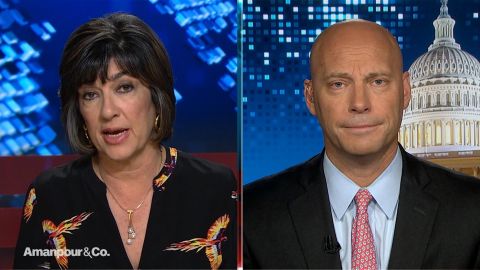Read Transcript EXPAND
MARC SHORT: I think Republicans in the House face a lot of head winds. I think the reality is that Americans like divided government. I think that Republicans have 44 retirements now among House Republicans. And when that happens, as retirement here and you create an open seat, you lose all the power seniority and all the power of incumbency. And so, that puts many more seats at play. And I think that the Democrats have the advantage in the House. Having said that, the playing field in the Senate is different. And I think Republicans will actually gain seats in the Senate. So, it will be somewhat of a split decision here in the United States in which Republicans get more power in the Senate but certainly, Democrats, I think, are poised to have a significant night on Tuesday in the House.
CHRISTIANE AMANPOUR: So, let me ask you to weigh in then because maybe it might be different if things weren’t so polarized and highly charged right now. I mean, the president, obviously, has — is able to run on the economic performance. And others have said, I’m not original on this, that you shouldn’t be having sort of, you know, almost no unemployment and a pretty good economy booming, plus the president’s low — you know, low-ish approval ratings. Those numbers shouldn’t be happening in the same sentence. So, what do you say then to those who are analyzing, for instance, you know, the people who were his coalition before, a lot of them being turned off by the race and the gender and the divisive aspects that the president keeps harping on?
SHORT: Well, I think it’s important to remember that when Donald Trump won the presidency, his approval rating was at 38 percent. So, I think people talk about numbers that are falling when, in fact, the country was divided. I do think you’re right that there’s been significant achievements and judicial appointments and the economy and the unemployment at all-time lows, growth it’s now over 3.5 percent this question, 4.2 percent the previous quarter. So, a lot of things going the right way. But as far as the campaign rhetoric, often, I think, voters don’t really care about what you’ve already done for him, it’s what you can do for me now. And so, that’s why I think you see a lot of the immigration discussion objective because there’s a complacency about the economy saying, “OK. Well, you already took care of that. What are the other issues that can motivate voters to come out?” And I think that’s why you see the administration focusing a lot on the immigration debate right now.
AMANPOUR: I mean, you, of course, yourself said that it was a political winner. You’ve said that in the past and presumably the president believes that as well. But let me get back to what might happen post Tuesday. If indeed there is divided government and you said the American people like that, what do you think is going to happen? Do you envision a House controlled by the Democrats, you know, putting up obstacles along the way even if they don’t go for impeachment as, you know, Minority Leader Pelosi has said that that’s not where her focus is. What do you see coming down the pike?
SHORT: Well, I think you’re going to see Democrats poise for a lot of investigations, a lot of subpoenas, the administration. And frankly, I do think you’ll see them proceed with impeachment hearings and some of them will be more of a show trial.
About This Episode EXPAND
Christiane Amanpour speaks with U.S. Senator Mark Warner about new theories about what happened to Jamal Khashoggi and former White House Director of Legislative Affairs Marc Short about President Trump’s pre-midterm rhetoric. Walter Isaacson speaks with U.S. Representative Garret Graves about cross-party cooperation.
LEARN MORE


